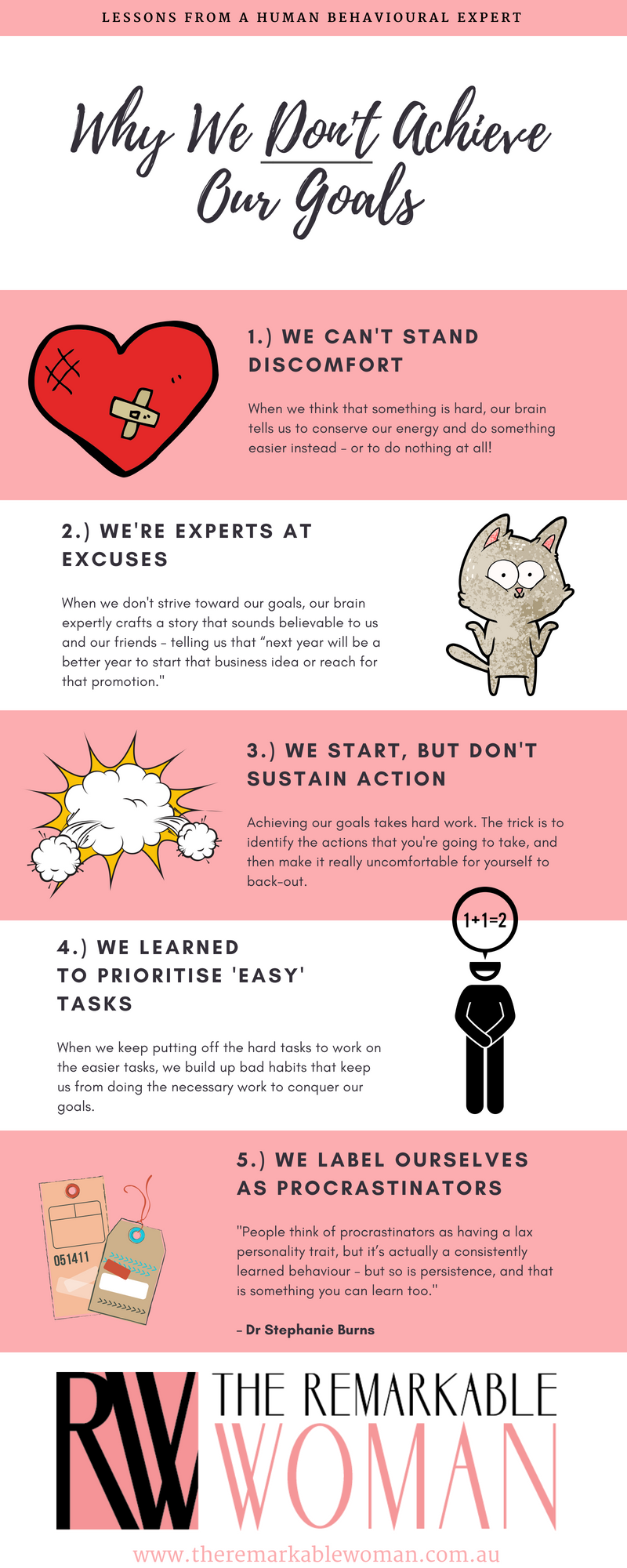Have you ever wondered why people have so much trouble achieving their goals? It seems like no matter how much you plan, schedule, or motivate yourself — you just can’t find the momentum to get things over the line. It’s ok, we definitely know the feeling…it happens to the best of us. The good news is it doesn’t need to stay that way.
Enter Dr Stephanie Burns: A woman who has dedicated 35 years of her life (and a Ph.D) to understanding human behaviour, success in adults and how to actually achieve your goals in todays fast paced world. Here are some insights to why really capable people don’t achieve their most important goals.
We move away from the uncomfortable
“We are biologically wired to move away from what’s uncomfortable,” says Dr Burns. We need to make a connection between our biology and our actions. When we perceive something hard or strenuous (like writing that business plan) our brain tells us to conserve energy and ignore the task at hand. Aka procrastination.
So, what do we do if we find ourselves falling into procrastination, the Netflix bubble or the mindless Facebook scroll?
First off, go easy on your self judgment; and instead employ two behaviours that successful people use to achieve their goals:
1. Don’t ask yourself “do I feel like doing this task?” Just don’t think, and start it.
Take action and just take the first step. If you think about it, you’ll come up with a “great” excuse on why you should be doing something else.
2. Initiate and sustain action in the direction of your goals
Once you’ve started, make it really uncomfortable for yourself to back out. For example, you get home from a hard day at work and you don’t feel like going to the gym. Tell yourself that you’re going to the gym, but you’re only going to do one exercise for 10 minutes — it’s a mind hack that works. Once you get to the gym and get started, it will take more effort to cool down and drive home and get changed than it will to just keep exercising; after all, you’re already right there.
We’re too good at making compelling excuses
“We’re just too smart for our own good” as Dr Burns would say. “When we stop doing what we said we were going to do; we get a feeling of guilt. And we use the big part of our brain (cerebrum) to construct a story and rationale; *cough excuses, as to why next year would be a far better time to start that business, or apply for that promotion because you got too much going on in your life right now. As long as the excuse sounds good enough to us, and we can convince other people buy it, we let ourselves off guilt-free.”
Here’s the catch: when people fall into this trap of making excuses, they tend to label themselves as procrastinators and non achievers. They get so used to not achieving things that they stop focusing on things to strive toward. People think of procrastinators as having a lax personality trait, but it’s actually a consistently learned behaviour — but so is persistence, and that’s something we can learn, too!
…And, if you really want to be successful, if you really want to achieve your goals, if you really want to live your best life — the good news is that you can learn persistence, and the success you deserve will follow.
5 key lessons from a human behavioural expert



